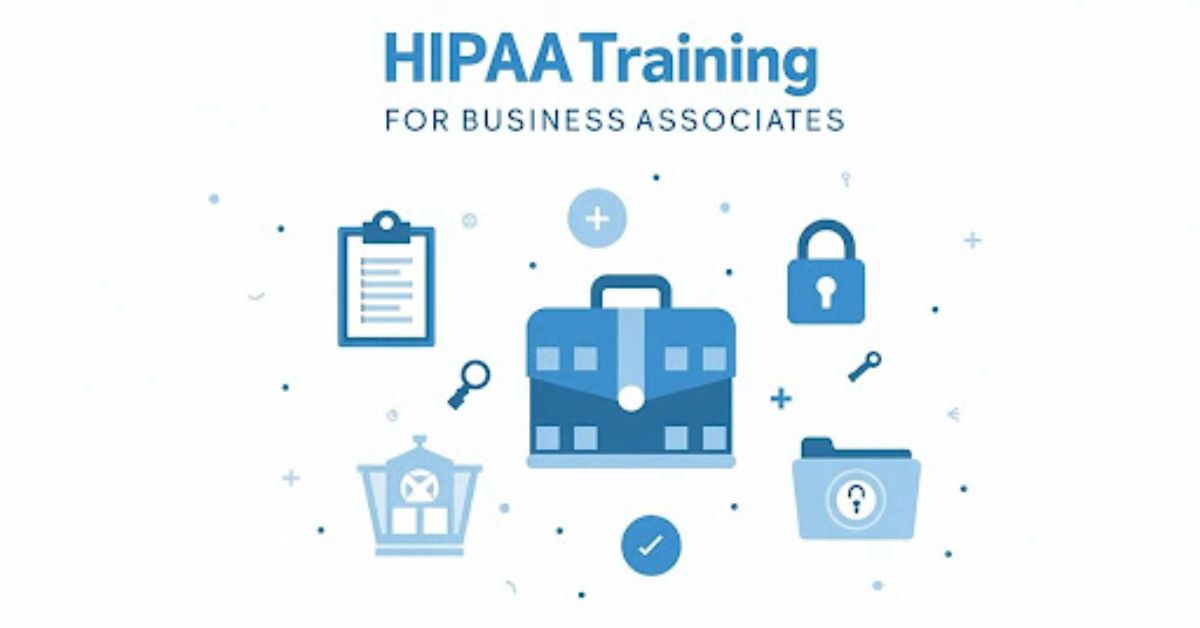Introduction
In today’s digital age, protecting sensitive health information is more critical than ever. If your company handles protected health information (PHI) for healthcare providers, insurers, or related organizations, you likely fall under the category of a “business associate.” Under the Health Insurance Portability and Accountability Act (HIPAA), business associates must take steps to ensure that the PHI they manage is secure. This means understanding and complying with HIPAA regulations to avoid costly fines and protect sensitive data.
In this blog, let us explore more about HIPAA certification for business associates and why it is important.
Who are Business Associates?
If you’re considering a HIPAA compliance course, it’s important first to understand who business associates are in the healthcare world. A business associate is any individual or organization that works with a healthcare provider or insurer and has access to protected health information (PHI).
Business associates aren’t just medical professionals; they can be companies or individuals performing various services that involve handling sensitive patient data.
Here are some examples of business associates:
- IT Service Providers: Companies that manage cloud storage, data backups, or maintain healthcare software systems.
- Billing and Coding Companies: Firms that handle patient billing, medical coding, or insurance claims.
- Legal and Accounting Firms: Professional services that might need access to patient data for legal or financial purposes.
- Consultants and Auditors: Individuals or firms hired to review healthcare operations, conduct audits, or provide expert advice.
- Third-Party Vendors: Any external service provider (e.g., transcription services, mailing companies) that interacts with PHI on behalf of a healthcare organization.
Steps for Business Associates to Become HIPAA Compliant
Ensuring HIPAA compliance as a business associate is essential to protecting sensitive health information and avoiding hefty fines. While there is no official HIPAA certification, following these steps can help your company meet the necessary standards and demonstrate compliance.
- Conduct a Risk Assessment
- Identify potential risks to the protected health information (PHI) you handle.
- Review your company’s current processes for managing, storing, and transmitting PHI.
- Document vulnerabilities and develop strategies to reduce risks.
- Develop a HIPAA Compliance Plan
- Create written policies and procedures that address HIPAA security and privacy rules.
- Outline how your business will handle PHI and respond to potential data breaches.
- Ensure your plan includes how to manage both physical and digital security measures.
- Implement Safeguards
- Physical Safeguards: Secure areas where PHI is stored or accessed, such as locking file cabinets and restricting access to certain areas.
- Administrative Safeguards: Assign staff responsible for HIPAA compliance, conduct regular training, and enforce data access policies.
- Technical Safeguards: Use encryption, secure passwords, and other technologies to protect digital PHI.
- Provide Regular Employee Training
- Ensure all employees handling PHI receive HIPAA training.
- Update training regularly to reflect new threats, changes in regulations, or updates to company policies.
- Make sure employees understand how to report breaches and security incidents.
- Sign Business Associate Agreements (BAAs)
- Establish formal agreements with any third parties that handle PHI on your behalf.
- Ensure your BAA outlines each party’s responsibilities in safeguarding PHI and responding to breaches.
- Regularly review and update agreements as needed.
- Monitor and Audit Compliance Efforts
- Conduct regular internal audits to ensure your compliance plan is being followed.
- Track changes in HIPAA regulations and update your compliance program as necessary.
- Respond swiftly to any identified risks or breaches.
- Report Breaches When Necessary
- In the event of a data breach, follow HIPAA’s guidelines for breach notification.
- Notify your healthcare partners and affected individuals promptly if PHI is compromised.
- Take corrective action to prevent future breaches.
Why is HIPAA Important for Business Associates?
HIPAA is crucial for business associates because it ensures they protect sensitive patient information. As per reports, since April 2003, when the HIPAA Privacy Rule took effect, the Office for Civil Rights (OCR) has received over 366,000 complaints about potential violations and launched more than 1,100 compliance reviews. Here’s why it’s important:
- Legal Responsibility: Under HIPAA, business associates are directly liable for safeguarding PHI.
- Financial Penalties: Violating HIPAA can result in hefty fines. Depending on the level of negligence, penalties can reach up to $25,000 per year for violations.
- Trust and Reputation: Being HIPAA compliant builds trust with healthcare clients.
- Avoiding Data Breaches: Compliance helps prevent data breaches, which can damage both the business associate’s and the healthcare provider’s credibility and result in costly breach notifications and penalties.
Wrapping Up
Understanding and following HIPAA rules is crucial for anyone handling personal health information. Achieving HIPAA certification for business associates demonstrates a company’s commitment to safeguarding patient data and maintaining compliance with privacy laws. By staying informed and compliant, you help protect privacy and ensure trust in healthcare.











